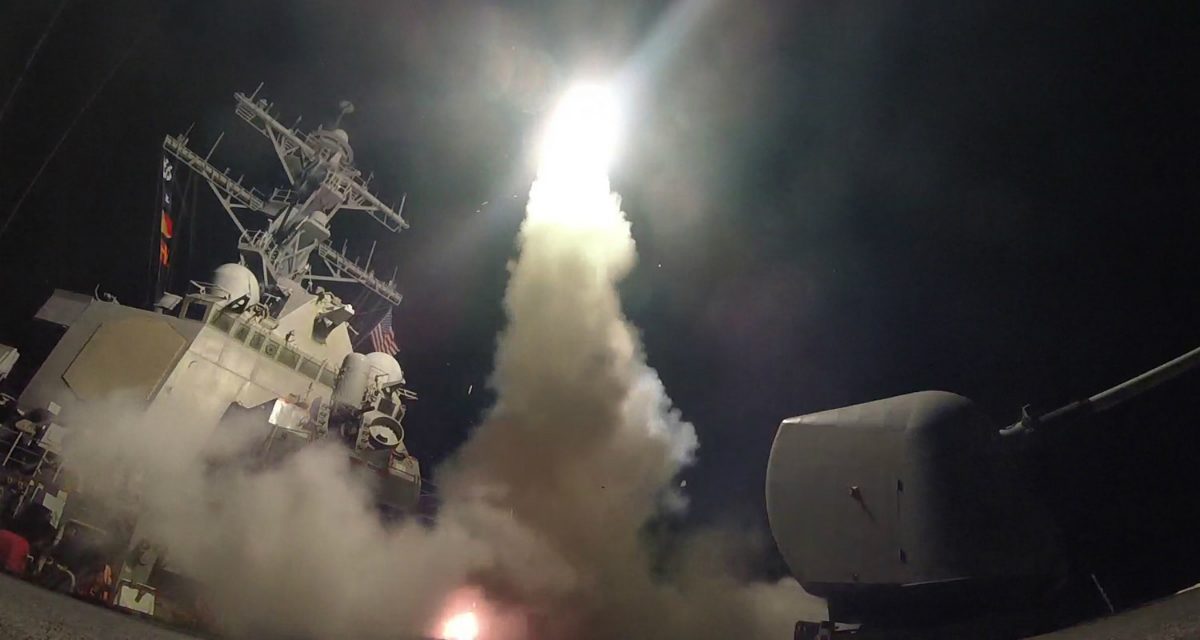If Assad wanted to know what would provoke Donald Trump to attack him directly, fifty-nine Tomahawk missiles gave the answer on April 6. Two days earlier, the town of Khan Sheikhoun southwest of Idlib was hit by a deadly nerve agent, likely sarin gas, killing over eighty civilians. This was the same nerve agent that Syrian armed forces used in a rebel-held area near Damascus in 2013, which triggered President Obama’s famous red line.
While Russia insists the attack was a false flag operation, several factors indicate that the regime was behind the recent attack, despite their ostensible disarmament. First, US officials announced that American intelligence agencies tracked Syrian aircraft leaving Sharyat airfield to Khan Sheikhoun and back around the time of the chemical attack. Second, after the chemical attack itself, aircraft struck a medical building and a makeshift hospital where the victims were being taken. Third, while ISIS has used chemical weapons, they have been restricted to chlorine and mustard gas, rather than the more advanced sarin gas that appears to have been used recently. Finally, embattled Syrian President Bashar al-Assad has been accused of using other chemical weapons since allegedly handing over his chemical weapon stockpile in 2013, but none of the attacks have been as deadly or garnered as much international attention as the one last Tuesday.
As pundits debate the wisdom of the United States’ retaliatory airstrikes, who the audience of the strike was, and what the next steps of the administration can or should be, a critical question is often overlooked: why did the Syrian regime use chemical weapons now?
Political science debates two mutually exclusive characteristics of human behavior: either an actor is rational—in that he or she minimizes material costs and maximizes material benefits—or irrational—his or her motivations lay far more with immaterial or emotional factors than straightforward material considerations. In order to assess whether the United States’ punitive strikes will achieve their intended aim of deterring Assad from future chemical weapons attacks, we must first understand whether Assad’s use of chemical weapons was rational or irrational.
If Assad was making a purely rational calculation to minimize costs and maximize benefits, the use of chemical weapons now seems an unnecessarily risky move.
The benefits for Assad of this very provocative attack are not immediately clear. First, the military necessity of the attack was minimal. The Ghouta strike of 2013 killed many more people and occurred at a sensitive time of the civil war before Russian intervention when the regime was under serious military pressure. By contrast, while the Syrian government is not close to winning the war, it is now on a much sounder footing, which makes the undertaking of risks seem unwise. Even if Assad’s regime was in dire straits, there is no reason to believe that the chemical weapons attack would have been militarily more advantageous than any of his other tactics. The regime has shown itself willing (and able) to kill as many civilians using other methods (see: barrel bombs) as it did using the sarin gas, so the use of chemical weapons seems unnecessarily provocative.
Second, some commentators have already pointed out that Assad (or his Russian patron) may have wanted to test the resolve of the new Trump administration. They argue that Assad had no disincentive to use chemical weapons, but he also had no real incentives to do so either. Chemical weapons are expensive, very high-profile, and very taboo—not to mention, as outlined previously, militarily unnecessary for the Syrian regime. In this context, testing the United States’ resolve is a huge risk to take for a limited reward.
Third, Assad could be seen as trying to implement “salami slicing” tactics, where one takes a series of small actions that individually seem innocuous, but that accumulate into a large strategic change. The use of a limited chemical strike, which is not strategically significant, could be seen as an attempt to build towards the normalization of large-scale chemical weapons usage, which could prove a great boon to the regime’s efforts. The dichotomous nature of chemical weapons (either you use them or you don’t), however, argues against this in a similar way that Thomas Schelling argued that nuclear weapons were not prone to salami slicing.
Perhaps the most convincing possible benefit was that the attack could have served as a show of strength for domestic audiences. If Assad was able to blatantly use chemical weapons in direct violation of international agreements and face no retaliation from the United States or another actor, his regime’s legitimacy would skyrocket—and, combined with the sheer shock and awe, the action could serve to instill deeper fear among the rebels.
Although these benefits may have seemed tempting to Assad, once compared to the possible costs he could face, the attack seems very high risk. First, given the lack of a track record for Trump and his therefore unpredictable nature, his reaction could be potentially catastrophic for the Syrian regime. Second, recent moves by the Trump administration ranged from neglect of the Syrian civil war to apparent acceptance of the catastrophic conflict. For Assad, undertaking a risk that could change that could have disastrous consequences with little prospective payoff. Finally, Syrian use of chemical weapons after its Russian patron had assured the world of chemical disarmament makes the Russians look unable to control their Syrian client. While Putin certainly wants Assad to succeed, needlessly provoking an ally never seems like a wise strategy.
Of course, being rational does not necessarily mean that an actor is wise. The chemical attack could have simply been a foolish miscalculation. Assad could have misunderstood the White House’s statement about accepting the Assad regime as carte blanche for any actions; while we might not think that the United States is the best at signaling its intentions to its allies, this would have been a dramatic misreading that would not have been likely by Assad, who is after all politically savvy enough to keep a coalition together despite enormous external pressure. And while a miscalculation of this magnitude seems improbable for Assad, it would have been equally so for his Russian advisors.
What could we learn from looking at perspectives that do not assume that the state is a rational, unitary actor?
Perhaps the first hypothesis that comes to mind related to irrationality is that Assad is evil. This argument is kin to an extensive school of thought in the 1990s that pointed to primordial hatreds as the basis for ethnic conflict in the Balkans. The logic goes that Assad, as a member of the minority Alawite sect, simply hates the Sunni opposition and will do everything in his power to destroy them. Taken at face value, however, this logic does little to explain why the regime chose to refrain from using sarin gas until Tuesday. Why would Assad’s evilness increase now? This perspective begs for more explanation.
A few other arguments that acknowledge motivations beyond straightforward hyper-rationality may have more to say on the matter, though. In his classic 1969 article, Graham Allison laid out the case for a bureaucratic politics model, where countries undertake actions not as strict rational calculations but rather as the result of bureaucratic compromise. In this framework, “where you stand depends on where you sit”—the organizational roles that individuals fill are powerful predictors of their behavior. In Assad’s Syria, we cannot be certain of what the internal balance of power between domestic actors is, but some analysts believe that Assad’s internal position is weak. It is possible that the decision to use chemical weapons was the result of some political compromise, where one powerful actor (such as the feared Air Force Intelligence Directorate) had a strong incentive to use chemical weapons and forced the others to compromise against their better judgment. One could easily imagine that the part of the regime responsible for keeping chemical weapons would have a strong reason to use them if they were worried that they were being politically marginalized, for example by feeling that the ground forces’ recent gains had given them undue prestige that threatened the internal position of the air force. With some sources arguing that the authority to use chemical weapons has been devolved below Assad, the bureaucratic politics model looks like a more likely candidate to explain why such a seemingly irrational action would be undertaken.
Another possibility, however unlucky, is that the chemical weapon attack was the result of human error. At first glance, this seems ludicrous: wouldn’t such a powerful weapon have multiple safeguards in order to ensure its use is tightly controlled? But there have been several “close calls” with nuclear weapons where they were “almost” used in situations where the central authority did not want them used (we put “almost” in quotes because the degree of closeness is debated, but the point still stands). If a force as disciplined, well-funded, and trained as the United States military could come somewhat close to inadvertently using nuclear weapons, it stands to reason that the strains of six years of nonstop warfare would have produced a mistake by someone in Syria’s air force. One scenario could be that the ordnance officer was killed or transferred without telling his replacement what type of bombs those were in the back of the warehouse. Some chemical ordnance has special safeguards specifically designed to preclude this possibility (such as requiring special arming to mix two otherwise inert agents); one would also imagine that any chemical weapons would be well marked. We admit that this is an unlikely scenario: to civilians who have never been in the military it seems impossible. To servicemembers (like one of the authors) who remember the number of “negligent discharges” that occurred on deployment, however, this seems very plausible.
Finally, this attack could have resulted from some emotional shock to Assad. Jon Elster has written about the possibility of using emotions to explain economic events; increasingly, behavioral economics studies the impact of emotions on decision making. The biggest problem is that it is very hard to measure emotions outside of self-reporting; still, we could believe that Assad would adopt an irrational line of behavior in response to some emotional shock. There is no evidence for something as direct as, say, an assassination attempt on Assad or a close family member that led to a petulant over-reaction. But on the other hand, after years of being constantly under siege, Assad’s frustration and uncertainty could have simply boiled over and caused him to lash out. While these sorts of explanations are unappealing to social scientists who wish to explain variation in terms of observable structural variables, it makes intuitive sense to anyone who has made a bad decision while tired and later regretted it.
The rational paradigm does not seem to do a good job in explaining the Syrian regime’s chemical strike. Indeed, it is so aberrant that some have even suggested that it was a false flag operation by the rebels. But we don’t have to believe something so spectacular to comprehend this seemingly irrational act. Social science has several other mechanisms—bureaucratic politics, human error, or emotions, to name a few—that can explain the Syrian regime’s actions. Actors, especially people involved in the fog and friction of a half-decade-long civil war, may not always be boiled down to a hyper-rational caricature. Although a rational paradigm might make political scientists and policymakers searching for logic and predictability the most comfortable, the long list of other possibilities show the dangers inherent in ascribing hyper-rationality to an adversary. As we craft our response to reestablish deterrence of chemical weapons, we should be wary of falling into the trap of overestimating our enemies.
The views expressed in this article are those of the author and do not reflect the official policy or position of the Department of the Army, the Department of Defense, or the US government.




One of the lessons from behavioral science and finance – both in laboratory settings and in the real world – is that sometimes when humans are involved, really crazy stuff happens that ought not to ever happen in a rational world.
Just because informed logic dictates that Assad NEVER SHOULD HAVE USED sarin gas in Syria is a very different proposition than Assad NEVER USING sarin gas. And since evidence suggests that Assad’s forces have sarin gas weapons in Syria, it’s a good bet that Assad’s forces used them.